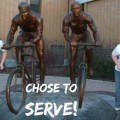It seems surreal to consider the wealth of information at our fingertips. I once misplaced a cherished family video that I thought I would be able to keep and share with family and posterity for a lifetime. As tragic as that seemed at the time, I am realizing now that I have lost a lot more than that, and so have you. Let me explain.
 Just consider the email accounts you have had, the pictures you have taken with your phone, and the myriad of other digital and physical keepsakes you have collected. Everybody has a box or two of keepsakes collecting dust without having a place to put them. My wife and mother-in-law made photo albums of the children when they were young. Each of my married children has an onslaught of media, and all of them have phones with thousands of images, videos, and posts in the aggregate. And we haven’t even begun to talk about the web pages, social media accounts, and digital cosmos of memories!
Just consider the email accounts you have had, the pictures you have taken with your phone, and the myriad of other digital and physical keepsakes you have collected. Everybody has a box or two of keepsakes collecting dust without having a place to put them. My wife and mother-in-law made photo albums of the children when they were young. Each of my married children has an onslaught of media, and all of them have phones with thousands of images, videos, and posts in the aggregate. And we haven’t even begun to talk about the web pages, social media accounts, and digital cosmos of memories!
With an estimated number of approximately 4.54 billion web pages, it is easy to see that if just a small fraction of those are related to us, our homes, and families, we still have more data than we can possibly consume. The estimates will blow your mind, beginning with 2.5 quintillion bytes of data created each day at our current pace. Yes. That’s a big number—18 zeroes after the digits—every day.
So with all of this being only a small fraction of the memories that you have, how are we ever going to share the stories that we want shared, save the pictures we love, and communicate the messages we feel are important to our family, homes, and loved ones? I don’t yet have the answer, but gratefully I have received some valuable guidance that is helping me accumulate the most important items.
An excerpt from my father’s journal has always intrigued me and is the perfect segue into today’s discussion. He wrote the following:
I never really knew my Grandma because she had passed away. Grandpa lived down in the Santa Clara area of Utah. He came up to Salt Lake City on rare occasions. I was very young and barely remember seeing him before he passed away. I have a photograph that shows he apparently went on a trip with my family once when I was young.
I know my Grandpa very well though, because he wrote a journal that told much of his life’s experiences. I am so grateful for that. If I were to lose everything I had, and could only save a couple things, I’d grab my scriptures and [my grandpa’s journal]. It means that much to me. I’m sorry that my grandmother hadn’t written anything. She would have had much of interest to tell from her perspective. My great grandparents left their families in Switzerland and eventually came across the plains with handcarts to Utah. I wish I had something from them, too.
There are 164 pages in that journal. A copy was given to me when I was just a boy. Our family lovingly refers to it as “The Little Red Book,” and everyone in the extended family knows what we are talking about. Life experiences, wise counsel, and interesting family stories fill its pages. The cover of my book is marred and the binding on my copy somewhat broken because of significant use over many years.
 Just as my father articulated, it has come to hold a special place in our hearts. Each of my children was given their own copy. The stories and people involved are familiar to them just as they are to me. I, too, feel like I want my grandchildren to know about our lives and benefit from our experience.
Just as my father articulated, it has come to hold a special place in our hearts. Each of my children was given their own copy. The stories and people involved are familiar to them just as they are to me. I, too, feel like I want my grandchildren to know about our lives and benefit from our experience.
But we are having the exact opposite problem today. Instead of a single book or stack of papers or a memory to show for our lives, we have countless resources available and at our disposal. You may not even realize it, but it is spectacularly true. Government, church, schools, and society in general all use the Internet and phones. You have remnants of your life and experiences scattered all over the web.
So how are we going to begin sharing this wealth of information with our posterities? I don’t have an immediate answer. I am learning right along with all of you. But I can tell you what my family and I are doing in hopes of securing some things. My wish is that it will start benefitting all of you immediately.
1. Begin Now
Begin now. However you share your story, start right now. Life is busy and everyone need not wait to review all your stories, valuable memories, and life experiences. Besides, the wisdom and direction you share can begin benefitting people immediately. Why wait?
2. Think of Your Own Ancestors
You may feel that you have nothing to share or that what you do have is not important or interesting. Many of us feel that initially. But think of it this way: what if you had a glimpse into a family ancestor from a 100, perhaps 200 years ago? Maybe you share the same given name, maybe you have similar characteristics passed down through generations. Knowing what they did for a living or the challenges they faced would be interesting to say the least. I venture to guess that your posterity will have the same questions about you in a few years.
3. Schedule a Time
Schedule a regular time to save or generate your personal history. It may take form in the shape of letters, articles, notes, or a journal. The medium is not so important. It’s the content that is irreplaceable. Begin today and you will be glad you did
4. Share Every Day
Share portions of your history or journal every day, rather than waiting to drop the bomb on your friends and family all at once. I believe writing in our journals is as much for us as it is for our posterity.
5. Use Available Resources
Use predefined resources that are already available and working now. Family Search is a great example of this. There are dozens of other methods.
6. Practice Consistency
Be consistent. A little effort goes a long way. The benefits are immediate.
These are just a few ideas to get you started. Your memories are all just waiting for you to appreciate, save, and share them.
Don’t lose another minute.
Lead image via Huffington Post
In 1989, Walter Penning formed a consultancy based in Salt Lake City and empowered his clients by streamlining processes and building a loyal, lifetime customer base with great customer service. His true passion is found in his family. He says the best decision he ever made was to marry his sweetheart and have children. The wonderful family she has given him and her constant love, support, and patience amid life’s challenges is his panacea.






